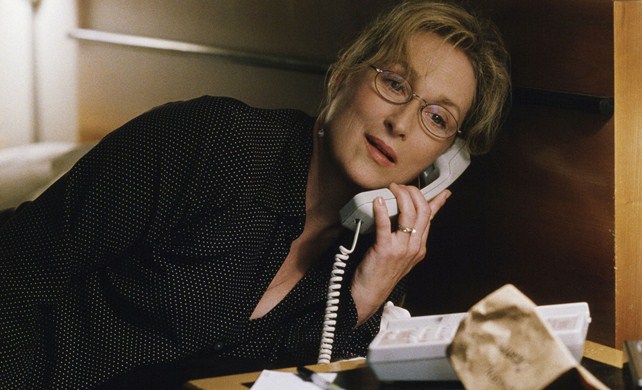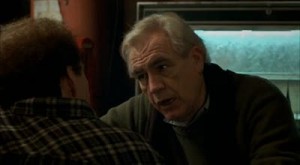The Movies I Love, #50: Adaptation

When I fished a video CD of Adaptation off a videostore bargain shelf circa 2005, I had no idea who Meryl Streep was. (I know, I know.) The cover lodged her squarely between Nicolas Cage, whom I vaguely knew, and Chris Cooper, whom I didn’t. At the time, what drew my eye lay above Streep’s face and name, where it proclaimed, in large font: “Academy Award Winner: Best Supporting Actor – Chris Cooper.” Ooh, I thought. An Oscar-winning performance. Might be interesting. No nominations were mentioned; the rest of the cover gave little else away.
My first Meryl
Adaptation thus holds the lone, eccentric honor of being the first and last Meryl Streep movie I’ve seen where I was not anticipating her performance. And unlike The Devil Wears Prada, which burnishes its own loin-girding introduction to Meryl for many of my generation and younger, Adaptation sneaks Meryl up on those who have yet to grasp her massive cultural chokehold over the ’80s cinema. Our initial glimpses of her typing solitarily in a high-rise office at night, slinking into a courthouse in session, or approaching Cooper’s chip-toothed hick for an interview hardly give off the vibes of a breathtaking role, even if her voiceovers of literary snatches from The Orchid Thief take on a mellifluous tone.
But later, when a single-scene character caresses her ponytail and tells her, “I can see your sadness. It’s lovely,” he could well be describing Meryl’s performance thereafter. Her Susan Orlean, taken aback by this alien frankness, drops her studied cheery exterior and molts into a creature of luminous self-doubt. Her subsequent reckonings with bathroom mirrors, and the shifts between her now-visibly upkept facade and the weariness lying just beneath, evoke a similar thrill to the performative challenges in Michael Clayton that won Tilda Swinton her Oscar half a decade later. And of course, there’s the lauded scene where Meryl loosens up: cradling her foot and improvising a ringtone, she brims with the infectious vitality and good humor that now defines her beloved post-’00s persona, both onscreen and off. For me, this is where it all began.
 For the love of Story
For the love of Story
Yet Adaptation also ties me to another beginning, that of my very cinephilia. In late 2004, reeling from my first breakup, I came across Robert McKee‘s screenwriting guide Story on the shelf of a local bookstore. In it, McKee was a prophet for the movies, a speaker for their vast potential intelligence and emotional power, and a believer in the neo-Aristotelian structures that made them work. Nor was he glaringly dogmatic about it. As Nicolas Cage’s McKee acolyte Donald is quick to defend in Adaptation, “Not rules. Principles. McKee writes, ‘A rule says you must do it this way. A principle says, this works, and has through all remembered time.'”
Like any poor soul on the rebound, I was hooked by such a seductive philosophy. McKee’s emphasis on structure was my first cool dip into the waters of critical moviegoing. It taught me that there was a sense behind the conjuring of emotion, that beneath plot developments and endings lay ideologies about how things are, or should be. But most vitally, it beguiled me with the notion that there was no enigma to our love for the movies that give us pleasure. The answer hides there, in plain sight, within the logic of story.
Eventually I would learn that that isn’t the whole story, as subsequent entries in this series will reveal. It helps that Adaptation itself is thoroughly ambivalent about McKee. As you might know, Adaptation took root as screenwriter Charlie Kaufman‘s attempt to adapt Susan Orlean’s non-fiction book The Orchid Thief to the screen, only to transmute after numerous false starts into a movie about his struggles to do so. Thus embedded within the latter’s McKee-approved protagonist-with-a-goal structure are defiant remnants of the former’s ambitions: a handful of drifting, meditative vignettes about the unknowing dance of life between bees and flowers, or the elusive search for a phantasmic orchid, that are held together beautifully by voiceover (a McKee no-no). Neither did McKee prepare me for that early moment when one of Adaptation‘s main characters tosses off an existential question, and the movie dives head-first through the origins of the universe in answer—a full nine years before Terrence Malick would attempt the same feat in The Tree of Life, with less comic flair and more earnest bravado.
Of course, these are mere vestiges of Kaufman’s curveball-throwing capitulations to McKee, whom he introduces as a third-act character to “save” his directionless script. This despite how Kaufman conjures a fictional screenwriting twin (the aforementioned Donald) whose blockbuster leanings he isn’t generous enough to take seriously; repeatedly, Kaufman hammers in the ease with which Donald’s ludicrous clichés win traction with the same studio executives to which he’s struggling to submit his own drafts. Nicolas Cage, too, takes this cue to play both twins with shallowly divergent, if lived-in, personalities.
By contrast, the oft-reliable Brian Cox embodies McKee without condescension, shifting with ease between comic Network-style bombast, practiced celebrity brush-off, and wizened mentorship. To be fair, Kaufman takes this to heart, too: Adaptation ends with a melange of sex, drugs, guns, car chases, dei ex machina, life lessons, growth, mutual liking and eventual success, and it does this in a tone that is distanced but also half-serious. If this commitment to ambivalence is what keeps me ambivalent to Adaptation in turn (explaining its placement at the lowest rung of this series), then the movie has also taught me that I don’t have to blot out its flaws in order to keep coming back to it, again and again.
Or perhaps that’s what love is.
Adaptation | 2002 | USA | Director: Spike Jonze | Screenplay: Charlie Kaufman, Donald Kaufman | Cast: Nicolas Cage, Meryl Streep, Chris Cooper, Brian Cox, Tilda Swinton

